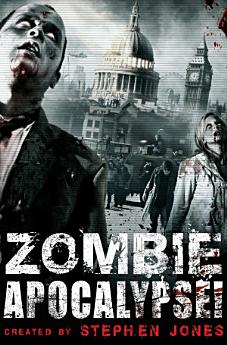Zombie Apocalypse!
តុលា 2010 · Hachette UK
3.2star
ការវាយតម្លៃ 13report
សៀវភៅអេឡិចត្រូនិច
480
ទំព័រ
family_home
មានសិទ្ធិ
info
reportការវាយតម្លៃ និងមតិវាយតម្លៃមិនត្រូវបានផ្ទៀងផ្ទាត់ទេ ស្វែងយល់បន្ថែម
អំពីសៀវភៅអេឡិចត្រូនិកនេះ
A "mosaic novel" set in the near-future, when a desperate and ever-more controlling UK government decides to restore a sense of national pride with a New Festival of Britain. However, controversial plans to build on the site of an old church in South London releases a centuries-old plague that turns its victims into flesh-hungry ghouls whose bite or scratch passes the contagion on to others. Even worse, the virus may also have a supernatural origin with the power to revive the dead.
Despite the attempts of the police, the military and those in power to understand and contain the infection commonly referred to as "The Death", it soon sweeps across London, transforming everyone who comes into contact with it. With the city - and the country - falling into chaos, even a drastic attempt at a "Final Solution" to eradicate the outbreak at its source fails to prevent it from spreading to Europe and then quickly throughout the rest of the world.
Soon there is no more news coming out of Britain . . . and it is up to those survivors in other countries to confront the flesh-eating invaders within their midst. Will humanity triumph over a world-wide zombie plague, or will the walking dead ultimately inherit the Earth?
Told through various disparate and overlapping eye-witness accounts, through texts, e-mails, blogs, letters, diaries, transcripts, official reports and other forms of communication, a picture builds up of a world plunged into chaos - where the dead attack the living, and only one of them can be the ultimate victor.
Written by some of the biggest and best-known names in horror and science fiction, these interconnected narratives create a unique vision of the End of the World brought about by a plague that may have its origins in both science and the occult.
Praise for Stephen Jones:
'Horror's last maverick.' - Christopher Fowler
'Stephen Jones . . . has a better sense of the genre than almost anyone in this country.'- Lisa Tuttle, The Times Books
'The best horror anthologist in the business is, of course, Stephen Jones.' - Roz Kavaney, Time Out
'Edited by Stephen Jones, a member of that tiny band of anthologists whose work is so reliably good that you automatically reach out and grab hold of any new volume spotted if you are wise.'- Gahan Wilson, Realms of Fantasy
'One of the genre's most enthusiastic cheerleaders.' - Publishers Weekly
Despite the attempts of the police, the military and those in power to understand and contain the infection commonly referred to as "The Death", it soon sweeps across London, transforming everyone who comes into contact with it. With the city - and the country - falling into chaos, even a drastic attempt at a "Final Solution" to eradicate the outbreak at its source fails to prevent it from spreading to Europe and then quickly throughout the rest of the world.
Soon there is no more news coming out of Britain . . . and it is up to those survivors in other countries to confront the flesh-eating invaders within their midst. Will humanity triumph over a world-wide zombie plague, or will the walking dead ultimately inherit the Earth?
Told through various disparate and overlapping eye-witness accounts, through texts, e-mails, blogs, letters, diaries, transcripts, official reports and other forms of communication, a picture builds up of a world plunged into chaos - where the dead attack the living, and only one of them can be the ultimate victor.
Written by some of the biggest and best-known names in horror and science fiction, these interconnected narratives create a unique vision of the End of the World brought about by a plague that may have its origins in both science and the occult.
Praise for Stephen Jones:
'Horror's last maverick.' - Christopher Fowler
'Stephen Jones . . . has a better sense of the genre than almost anyone in this country.'- Lisa Tuttle, The Times Books
'The best horror anthologist in the business is, of course, Stephen Jones.' - Roz Kavaney, Time Out
'Edited by Stephen Jones, a member of that tiny band of anthologists whose work is so reliably good that you automatically reach out and grab hold of any new volume spotted if you are wise.'- Gahan Wilson, Realms of Fantasy
'One of the genre's most enthusiastic cheerleaders.' - Publishers Weekly
ការដាក់ផ្កាយ និងមតិវាយតម្លៃ
3.2
ការវាយតម្លៃ 13
អំពីអ្នកនិពន្ធ
Stephen Jones lives in London, England. He is the winner of three World Fantasy Awards, four Horror Writers Association Bram Stoker Awards and three International Horror Guild Awards as well as being an eighteen-time recipient of the British Fantasy Award and a Hugo Award nominee. A former television producer/director and genre movie publicist and consultant, he has written, edited and co-written numerous books. He was a Guest of Honour at the 2002 World Fantasy Convention in Minneapolis, Minnesota, and the 2004 World Horror Convention in Phoenix, Arizona.
វាយតម្លៃសៀវភៅអេឡិចត្រូនិកនេះ
ប្រាប់យើងអំពីការយល់ឃើញរបស់អ្នក។
អានព័ត៌មាន
ទូរសព្ទឆ្លាតវៃ និងថេប្លេត
ដំឡើងកម្មវិធី Google Play Books សម្រាប់ Android និង iPad/iPhone ។ វាធ្វើសមកាលកម្មដោយស្វ័យប្រវត្តិជាមួយគណនីរបស់អ្នក និងអនុញ្ញាតឱ្យអ្នកអានពេលមានអ៊ីនធឺណិត ឬគ្មានអ៊ីនធឺណិតនៅគ្រប់ទីកន្លែង។
កុំព្យូទ័រយួរដៃ និងកុំព្យូទ័រ
អ្នកអាចស្ដាប់សៀវភៅជាសំឡេងដែលបានទិញនៅក្នុង Google Play ដោយប្រើកម្មវិធីរុករកតាមអ៊ីនធឺណិតក្នុងកុំព្យូទ័ររបស់អ្នក។
eReaders និងឧបករណ៍ផ្សេងទៀត
ដើម្បីអាននៅលើឧបករណ៍ e-ink ដូចជាឧបករណ៍អានសៀវភៅអេឡិចត្រូនិក Kobo អ្នកនឹងត្រូវទាញយកឯកសារ ហើយផ្ទេរវាទៅឧបករណ៍របស់អ្នក។ សូមអនុវត្តតាមការណែនាំលម្អិតរបស់មជ្ឈមណ្ឌលជំនួយ ដើម្បីផ្ទេរឯកសារទៅឧបករណ៍អានសៀវភៅអេឡិចត្រូនិកដែលស្គាល់។







